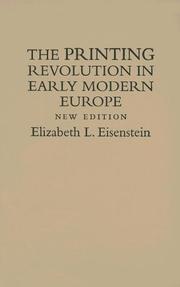| Listing 1 - 2 of 2 |
Sort by
|

ISBN: 0521607744 0521845432 9780521607742 9780521845434 9780511819230 0511819234 Year: 2005 Publisher: Cambridge Cambridge University Press
Abstract | Keywords | Export | Availability | Bookmark
 Loading...
Loading...Choose an application
- Reference Manager
- EndNote
- RefWorks (Direct export to RefWorks)
Although the importance of the advent of printing for the Western world has long been recognized, it was Elizabeth Eisenstein, in her monumental, two-volume work, The Printing Revolution in Early Modern Europe, who provided the first full-scale treatment of the subject. This illustrated and abridged edition gives a stimulating survey of the communications revolution of the fifteenth century. After summarizing the initial changes introduced by the establishment of printing shops, it goes on to discuss how printing affected three major cultural movements: the Renaissance, the Reformation, and the rise of modern science. This new edition includes a new essay discussing recent controversies provoked by the first edition and reaffirms the thesis that the advent of printing entailed a communications revolution. Fully-illustrated and annotated, the book argues that the cumulative processes set in motion with the advent of printing are likely to persist despite the recent development of new communications technologies.
Printing --- Technology and civilization. --- History --- Social aspects --- Europe --- Intellectual life. --- History. --- Book history --- book history --- communications [discipline] --- anno 1500-1799 --- Intellectual life --- Printing - Europe - History --- Europe - Intellectual life --- Civilization and machinery --- Civilization and technology --- Machinery and civilization --- Civilization --- Social history --- Technology --- Philosophy --- mentaliteitsgeschiedenis
Book
ISBN: 9780812242805 0812242807 0812222164 0812204670 1283897458 Year: 2011 Publisher: Philadelphia, Pa University of Pennsylvania Press
Abstract | Keywords | Export | Availability | Bookmark
 Loading...
Loading...Choose an application
- Reference Manager
- EndNote
- RefWorks (Direct export to RefWorks)
There is a longstanding confusion of Johann Fust, Gutenberg's one-time business partner, with the notorious Doctor Faustus. The association is not surprising to Elizabeth L. Eisenstein, for from its very early days the printing press was viewed by some as black magic. For the most part, however, it was welcomed as a "divine art" by Western churchmen and statesmen. Sixteenth-century Lutherans hailed it for emancipating Germans from papal rule, and seventeenth-century English radicals viewed it as a weapon against bishops and kings. While an early colonial governor of Virginia thanked God for the absence of printing in his colony, a century later, revolutionaries on both sides of the Atlantic paid tribute to Gutenberg for setting in motion an irreversible movement that undermined the rule of priests and kings. Yet scholars continued to praise printing as a peaceful art. They celebrated the advancement of learning while expressing concern about information overload.In Divine Art, Infernal Machine, Eisenstein, author of the hugely influential The Printing Press as an Agent of Change, has written a magisterial and highly readable account of five centuries of ambivalent attitudes toward printing and printers. Once again, she makes a compelling case for the ways in which technological developments and cultural shifts are intimately related. Always keeping an eye on the present, she recalls how, in the nineteenth century, the steam press was seen both as a giant engine of progress and as signaling the end of a golden age. Predictions that the newspaper would supersede the book proved to be false, and Eisenstein is equally skeptical of pronouncements of the supersession of print by the digital.The use of print has always entailed ambivalence about serving the muses as opposed to profiting from the marketing of commodities. Somewhat newer is the tension between the perceived need to preserve an ever-increasing mass of texts against the very real space and resource constraints of bricks-and-mortar libraries. Whatever the multimedia future may hold, Eisenstein notes, our attitudes toward print will never be monolithic. For now, however, reports of its death are greatly exaggerated.
09 <08> --- 09 <08> Handschriften. Oude en merkwaardige drukken. Curiosa--Verzamelwerken. Reeksen--Boekwetenschap. Sociale aspecten van het boek. Boek en media. Toekomst van het boek --- Handschriften. Oude en merkwaardige drukken. Curiosa--Verzamelwerken. Reeksen--Boekwetenschap. Sociale aspecten van het boek. Boek en media. Toekomst van het boek --- Books --- Printing --- Library materials --- Publications --- Bibliography --- Cataloging --- International Standard Book Numbers --- Printing, Practical --- Typography --- Graphic arts --- History --- Social aspects&delete& --- Europe --- Intellectual life. --- Book history --- Graphics industry --- History. --- Social aspects --- Imprimerie --- Livres --- Histoire --- Aspect social --- Vie intellectuelle --- Cultural Studies. --- European History. --- Literature. --- World History.
| Listing 1 - 2 of 2 |
Sort by
|

 Search
Search Feedback
Feedback About UniCat
About UniCat  Help
Help News
News